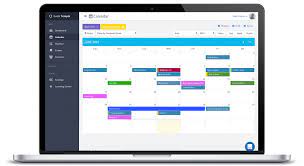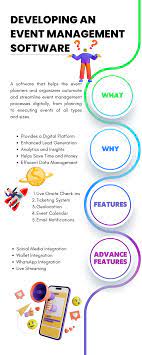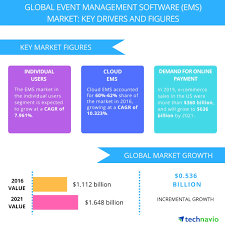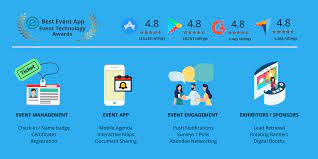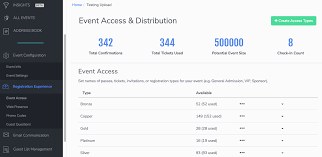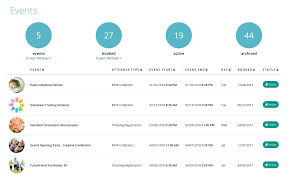Trade Show Event Management Software: Streamline Your Exhibitions
Trade shows and exhibitions are powerful platforms for businesses to showcase their products, network with industry professionals, and generate leads. However, organizing a successful trade show can be a complex and demanding task. This is where trade show event management software comes into play, revolutionizing the way events are planned, executed, and evaluated.
Trade show event management software offers a comprehensive suite of tools designed to simplify the entire event management process. From pre-event planning to post-event analysis, these software solutions automate various tasks, saving time, reducing errors, and enhancing overall efficiency.
One of the primary benefits of using event management software is the ability to streamline registration processes. With online registration forms and payment gateways integrated into the software, exhibitors and attendees can easily register for the event with just a few clicks. This eliminates manual data entry errors and allows organizers to track registrations in real-time.
Another key feature of trade show event management software is its ability to manage exhibitor profiles and booth assignments. Organizers can create interactive floor plans that enable exhibitors to select their preferred booth locations based on availability. This not only simplifies the booth assignment process but also enhances exhibitor satisfaction by giving them more control over their presence at the event.
Furthermore, event management software facilitates effective communication between organizers and participants. Automated email notifications can be sent to exhibitors and attendees regarding important updates such as schedule changes or special announcements. Additionally, built-in messaging systems allow for seamless communication between exhibitors, attendees, and organizers before, during, and after the event.
On-site logistics are also greatly improved with trade show event management software. With features like badge printing and check-in systems integrated into the software, long queues can be avoided at registration counters. Furthermore, real-time tracking of attendee movements within the venue helps organizers identify popular areas of interest and optimize traffic flow accordingly.
Post-event analysis is vital in determining the success of a trade show. Event management software provides robust reporting and analytics capabilities, allowing organizers to gather valuable insights into attendee demographics, engagement levels, and overall event performance. These insights can then be used to make data-driven decisions for future events and improve ROI.
In conclusion, trade show event management software has revolutionized the way exhibitions are organized. By automating various tasks and providing comprehensive tools for planning, execution, and evaluation, these software solutions save time, reduce errors, and enhance overall event efficiency. Whether you’re a small business or a large corporation, utilizing trade show event management software can greatly contribute to the success of your next exhibition.
9 Advantages of Trade Show Event Management Software: Enhancing Visibility, Communication, Efficiency, and More
- Increased visibility
- Streamlined communication
- Automated processes
- Improved efficiency
- Cost savings
- Comprehensive data tracking
- Customizable features
- Flexible scalability
- Security measures
Challenges of Trade Show Event Management Software: High Cost, Complexity, Limited Functionality, and Security Concerns
- High Cost
- Complexity
- Limited Functionality
- Security Issues
Increased visibility
Increased Visibility: Boosting Your Event’s Reach with Trade Show Event Management Software
When it comes to organizing a successful trade show or exhibition, one of the key objectives is to attract as many attendees as possible. This is where trade show event management software proves to be an invaluable tool, offering a range of features that can significantly increase the visibility of your event.
One of the primary ways in which event management software enhances visibility is through its online registration and promotion capabilities. By providing an easy-to-use online registration platform integrated into the software, organizers can reach a wider audience and make it convenient for potential attendees to sign up. This eliminates the need for manual registration processes and allows for seamless data collection.
Furthermore, event management software often includes built-in marketing tools that enable organizers to promote their event across various channels. From email marketing campaigns to social media integration, these tools help spread the word about your trade show or exhibition, reaching a larger audience and generating more interest.
Additionally, many event management software solutions offer features such as exhibitor directories and interactive floor plans. These features allow exhibitors to showcase their products or services in a visually appealing and easily accessible manner. Attendees can browse through exhibitor profiles, explore booth locations on virtual maps, and plan their visit accordingly. This not only increases the visibility of individual exhibitors but also enhances the overall appeal of your event.
Another advantage of using event management software is its ability to capture valuable attendee data. By collecting information during the registration process or through interactive features within the software, organizers gain insights into attendee preferences, interests, and demographics. This data can then be used to personalize marketing efforts and tailor promotional strategies to attract specific target audiences.
Moreover, event management software often integrates with popular event listing platforms or industry-specific directories. This integration ensures that your trade show or exhibition gets maximum exposure by being listed alongside other notable events in your industry. Attendees actively searching for events in your niche will have a higher chance of discovering and considering your event.
In conclusion, trade show event management software offers a powerful advantage in increasing the visibility of your event and attracting more attendees. By leveraging online registration, marketing tools, exhibitor directories, attendee data collection, and integration with event listing platforms, organizers can significantly expand their reach and make their event stand out in a crowded market. If you’re looking to boost attendance and maximize the impact of your trade show or exhibition, utilizing event management software is a smart choice.
Streamlined communication
Streamlined Communication: Enhancing Collaboration with Event Management Software
Effective communication is the backbone of any successful event. In the realm of trade shows and exhibitions, where multiple stakeholders are involved, clear and efficient communication becomes even more critical. This is where trade show event management software shines by providing a streamlined way to communicate with vendors, sponsors, exhibitors, and other stakeholders throughout the planning process.
Gone are the days of relying solely on phone calls, emails, or in-person meetings to convey important information. Event management software offers a centralized platform where all stakeholders can access relevant event details and engage in real-time communication. This not only saves time but also ensures that everyone involved is on the same page.
With event management software, organizers can easily send out mass communications to all participants or target specific groups with tailored messages. Whether it’s sharing updates about the event schedule, providing guidelines for booth setup, or announcing last-minute changes, these software solutions enable instant and efficient communication.
Furthermore, built-in messaging systems within event management software allow for seamless communication between organizers and exhibitors/vendors. This eliminates the need for multiple email threads or phone calls and provides a dedicated channel for addressing queries or concerns. By having all communication consolidated in one place, organizers can easily track conversations and ensure that nothing falls through the cracks.
Collaboration among stakeholders is also greatly enhanced through shared documents and resources within event management software. Organizers can upload important documents such as floor plans, exhibitor manuals, or sponsorship packages for easy access by vendors and exhibitors. This promotes transparency and helps everyone stay informed about expectations and requirements.
Additionally, some event management software solutions offer features like task assignment and progress tracking. Organizers can assign specific tasks to team members or external partners/vendors directly within the software. This not only streamlines task management but also allows for better accountability as progress can be tracked in real-time.
In summary, streamlined communication is a significant advantage of trade show event management software. By providing a centralized platform for communication, these software solutions eliminate the need for scattered emails and phone calls, ensuring that all stakeholders are well-informed and connected throughout the planning process. With improved collaboration and efficient information sharing, organizers can focus on delivering an exceptional event experience for exhibitors, sponsors, and attendees alike.
Automated processes
Automated Processes: The Key Advantage of Trade Show Event Management Software
Organizing a trade show or event involves numerous tasks that can be time-consuming and prone to errors if done manually. This is where trade show event management software comes to the rescue, offering a game-changing advantage: automated processes.
One of the primary benefits of utilizing event management software is its ability to automate various tasks associated with organizing an event. Take registration, for example. Instead of manually collecting attendee information and processing registrations, event management software provides an online platform where attendees can easily register themselves. This not only saves time but also eliminates the possibility of errors that may occur during manual data entry.
Scheduling is another area where automation shines. With event management software, organizers can create and manage schedules effortlessly. They can set up sessions, allocate speakers or exhibitors to specific time slots, and even send automated reminders to participants about upcoming events or changes in the schedule. This automation ensures that everyone involved stays informed and on track without the need for constant manual intervention.
Ticketing is yet another task that becomes hassle-free with event management software. Instead of relying on physical tickets or manually tracking ticket sales, organizers can set up an online ticketing system integrated into the software. Attendees can purchase tickets conveniently through a secure payment gateway, receive digital tickets via email, and have their attendance verified electronically at the venue entrance. This streamlined process not only enhances attendee experience but also simplifies ticket management for organizers.
Moreover, trade show event management software automates other essential aspects such as badge printing, check-ins, and data collection during the event itself. These automated processes eliminate long queues at registration counters and provide real-time insights into attendee numbers and demographics.
By automating these tedious tasks, trade show event management software allows organizers to focus on more strategic aspects of their events. It frees up valuable time and resources that can be redirected towards enhancing the overall experience for both exhibitors and attendees.
In conclusion, the automation capabilities of trade show event management software are a game-changer for event organizers. By automating processes such as registration, scheduling, ticketing, and more, this software streamlines operations, reduces errors, and saves precious time. Embracing this technology empowers organizers to deliver seamless and efficient events that leave a lasting impression on participants.
Improved efficiency
Improved Efficiency: Streamline Your Trade Show Planning with Event Management Software
Organizing a trade show involves juggling numerous tasks and coordinating various aspects to ensure a successful event. This is where trade show event management software shines, offering a powerful solution to boost your team’s efficiency during the planning process.
One of the key advantages of utilizing event management software is its ability to streamline processes and automate tasks. With a centralized platform, you can easily manage and track all aspects of your trade show, from exhibitor registrations to floor plan management, communication, and more.
Gone are the days of manually handling registration forms and spreadsheets. Event management software allows for seamless online registration, eliminating time-consuming administrative work. Exhibitors and attendees can register with ease, while organizers can effortlessly monitor registrations in real-time. This automation not only saves valuable time but also minimizes errors that may occur during manual data entry.
Efficiency is further enhanced through features like automated email notifications. Instead of individually sending updates or reminders to exhibitors and attendees, event management software allows you to set up automated emails for important announcements or changes in schedules. This ensures that everyone receives timely information without requiring manual effort from your team.
Another area where trade show event management software excels is floor plan management. With intuitive tools, you can create interactive floor plans that enable exhibitors to select their preferred booth locations based on availability. This eliminates the need for back-and-forth communication and speeds up the booth assignment process. As a result, your team can focus on other critical tasks while ensuring exhibitor satisfaction.
Collaboration among team members is also significantly improved with event management software. Instead of relying on scattered spreadsheets or disparate communication channels, everyone can access the same platform to view updates, share documents, and communicate seamlessly. This fosters better coordination within your team, reduces miscommunication, and enhances overall productivity.
By harnessing the power of trade show event management software, you can transform the planning process from a time-consuming endeavor to a streamlined and efficient workflow. With automation, centralized data management, and collaborative features, your team can focus on high-value tasks that contribute to the success of your trade show. Embrace the benefits of event management software and unlock a new level of efficiency for your next trade show.
Cost savings
Cost savings: The Advantage of Trade Show Event Management Software
Organizing a trade show or large-scale event can be an expensive endeavor. However, trade show event management software offers a significant advantage in terms of cost savings. By leveraging automated processes, this software reduces the need for manual labor, ultimately saving you money while improving overall efficiency and productivity levels for your staff members.
One of the primary ways trade show event management software helps you save costs is by streamlining administrative tasks. Traditionally, managing registrations, processing payments, and handling data entry required a considerable amount of time and manpower. With event management software, these processes are automated, reducing the need for manual intervention and minimizing errors. This not only saves valuable staff hours but also eliminates the associated labor costs.
Additionally, event management software simplifies communication with exhibitors and attendees. Instead of relying on costly printed materials or physical mailings, you can use built-in email communication tools to send updates and notifications to participants. This not only saves on printing and postage expenses but also allows for faster and more efficient communication.
Furthermore, trade show event management software optimizes resource allocation. By providing real-time data on booth assignments, attendee numbers, and traffic flow within the venue, organizers can make informed decisions regarding space utilization and staffing requirements. This ensures that resources are allocated effectively without unnecessary expenditures on additional booths or excessive staff members.
Moreover, post-event analysis provided by event management software helps identify areas where cost savings can be achieved in future events. Through comprehensive reporting and analytics features, organizers gain insights into attendee preferences, engagement levels, and overall event performance. These insights enable informed decision-making when it comes to budget allocation for marketing efforts or determining areas where costs can be reduced without compromising attendee experience.
In conclusion, trade show event management software offers a significant advantage in terms of cost savings for organizers. By automating administrative tasks, streamlining communication processes, optimizing resource allocation, and providing valuable post-event analysis, this software reduces manual labor costs while improving overall efficiency and productivity levels. Embracing this technology not only saves money in the long run but also enhances the success and profitability of your trade shows or large-scale events.
Comprehensive data tracking
Comprehensive Data Tracking: Enhancing Decision-Making with Event Management Software
When it comes to organizing a successful trade show or exhibition, having access to accurate and timely data is crucial. This is where trade show event management software excels, offering comprehensive data tracking capabilities that empower organizers to monitor progress at every stage of the planning process.
Gone are the days of relying on manual spreadsheets and guesswork. Event management software allows you to gather and analyze data in real-time, providing valuable insights that can inform decision-making and drive success.
From the initial registration phase to post-event analysis, event management software captures and organizes a wealth of information. This includes attendee demographics, registration numbers, exhibitor profiles, booth assignments, session attendance rates, and more. With all this data at your fingertips, you can gain a deeper understanding of your audience and make informed choices that resonate with their preferences and needs.
One of the key advantages of comprehensive data tracking is the ability to identify patterns and trends. By analyzing attendee demographics, you can gain insights into your target market’s characteristics, helping you tailor marketing efforts more effectively. Additionally, tracking registration numbers allows you to gauge interest levels in real-time and make adjustments as needed to maximize attendance.
During the event itself, data tracking enables you to monitor attendee engagement levels. By analyzing session attendance rates or booth visitation patterns, you can identify which areas are generating the most interest and adjust your event layout or schedule accordingly. This ensures that attendees have a meaningful experience while optimizing resource allocation for exhibitors.
Post-event analysis is equally important for future planning. Event management software provides detailed reports on various metrics such as attendee satisfaction surveys or lead generation effectiveness. These insights allow you to evaluate the overall success of your event objectively and identify areas for improvement in subsequent exhibitions.
With comprehensive data tracking offered by event management software, organizers can make better-informed decisions throughout each stage of the planning process. By leveraging real-time data and valuable insights, you can optimize your event’s impact, enhance attendee experiences, and drive long-term success.
In a fast-paced and competitive industry, utilizing event management software for comprehensive data tracking is an invaluable tool. It empowers organizers to make data-driven decisions, adapt to changing circumstances, and deliver exceptional experiences that leave a lasting impression on attendees.
Customizable features
Customizable Features: Enhancing Event Management with Trade Show Software
Trade show event management software has become an indispensable tool for organizers seeking seamless and efficient event planning. One of the standout advantages of this software is its customizable features, which empower users to tailor their experience to meet their specific needs and preferences.
With customizable options, trade show event management software allows organizers to create a personalized workflow that aligns perfectly with their event requirements. Users can choose from a range of features, modules, and settings to build a system that caters precisely to their unique event management process.
The ability to customize the software offers flexibility in adapting to different types of events. Whether organizing a large-scale trade show or a more intimate exhibition, organizers can configure the software to suit the specific demands of each event. This ensures that every aspect of the event management process is streamlined and optimized for maximum efficiency.
Customization also extends to branding and design elements. Organizers can incorporate their company logo, colors, and other branding elements into the software interface. This creates a cohesive and branded experience for both internal users and external participants, reinforcing brand identity throughout the event management journey.
Moreover, customizable features allow users to define workflows that align with their preferred processes. From registration forms to attendee tracking systems, organizers can tailor these components according to their specific requirements. This level of customization not only saves time but also enhances user satisfaction by providing an intuitive and user-friendly interface.
Trade show event management software also offers customization options for reporting and analytics. Organizers can select which data points they want to track and analyze, allowing them to focus on metrics that are most relevant to their goals. By customizing reports and analytics dashboards, users gain valuable insights into attendee engagement, ROI, and other key performance indicators.
In summary, customizable features are a significant advantage offered by trade show event management software. The ability to tailor the software according to specific needs allows organizers to optimize their event planning and execution processes. From branding to workflows and reporting, customization empowers users to create a personalized experience that maximizes convenience and satisfaction levels. By harnessing the power of customizable trade show event management software, organizers can take their events to new heights of success.
Flexible scalability
Flexible Scalability: Empowering Your Event Management
In the fast-paced world of trade shows and exhibitions, the ability to adapt and grow is crucial. This is where trade show event management software shines with its flexible scalability feature. Designed to accommodate growth without compromising performance or user experience, this software empowers organizers to seamlessly expand their events as needed.
One of the key advantages of trade show event management software is its ability to scale up or down based on the evolving needs of an event. Whether you’re organizing a small trade show or a large-scale exhibition, this software can easily adapt to meet your requirements. As your event grows, the software can effortlessly handle increased registrations, exhibitor profiles, and attendee data without sacrificing efficiency.
Flexibility is at the core of this feature. Event management software allows organizers to add new functionalities and modules as their needs evolve. For example, if you initially require basic registration and booth assignment features but later decide to incorporate networking tools or advanced analytics, the software can seamlessly integrate these additional capabilities. This ensures that your event management system remains adaptable and future-proof.
Scalability also extends to user experience quality. Trade show event management software is designed to maintain optimal performance levels even as the number of users and data volume increases. This means that attendees, exhibitors, and organizers can continue to enjoy smooth navigation, fast load times, and responsive features regardless of how much the event grows.
By embracing flexible scalability through event management software, organizers gain peace of mind knowing that their systems can keep up with their ambitions. They can confidently expand their events without worrying about technical limitations or compromising user satisfaction.
In conclusion, flexible scalability is a significant advantage offered by trade show event management software. Its ability to effortlessly accommodate growth while maintaining performance levels and user experience quality sets it apart from traditional manual processes or rigid systems. With this feature at your disposal, you have the freedom to scale up your events confidently while ensuring a seamless and enjoyable experience for all involved.
Security measures
Security Measures: Safeguarding Your Data with Trade Show Event Management Software
When it comes to organizing a trade show or exhibition, data security is of utmost importance. Trade Show Event Management Software offers a valuable advantage in this regard, providing advanced security measures that keep your data safe throughout the entire planning process.
One of the key security features of trade show event management software is encryption protocols. These protocols ensure that all sensitive information, such as attendee registration details and exhibitor contracts, are securely encrypted during transmission and storage. This means that even if unauthorized individuals gain access to the data, it will be virtually impossible for them to decipher or misuse it.
Additionally, two-factor authentication adds an extra layer of security to the software platform. This authentication method requires users to provide not only their login credentials but also a unique verification code sent to their registered device. By implementing two-factor authentication, trade show event management software ensures that only authorized individuals can access critical information and perform important tasks.
Secure payment processing is another crucial aspect of data security provided by event management software. With integrated payment gateways and secure transaction protocols, organizers can confidently collect payments from exhibitors and attendees without compromising their financial information. This protects against fraudulent activities and instills trust in participants who are sharing their payment details.
Furthermore, event management software often includes role-based access controls. This means that organizers can assign specific permissions and restrict certain functionalities based on user roles within the system. By controlling who has access to sensitive data and what actions they can perform, organizers can minimize the risk of unauthorized use or accidental misuse of information.
By utilizing trade show event management software with robust security measures in place, organizers can focus on planning a successful event without worrying about data breaches or compromised information. The peace of mind provided by these security features allows organizers to confidently handle confidential data throughout each stage of the planning process.
In conclusion, security measures offered by trade show event management software play a vital role in ensuring the safety and integrity of your data. From encryption protocols to two-factor authentication and secure payment processing, these advanced security features provide peace of mind and protect against unauthorized access or misuse of sensitive information. With trade show event management software, you can focus on delivering a seamless event experience while keeping your data safe and secure.
High Cost
High Cost: A Consideration in Trade Show Event Management Software
While trade show event management software offers numerous benefits, it’s important to consider the potential drawbacks as well. One significant con to be mindful of is the high cost associated with these software solutions.
Trade show event management software can be expensive to purchase, install, and maintain. The initial investment required for acquiring the software can be substantial, particularly for small businesses or organizations with limited budgets. Additionally, there may be additional costs involved in customizing the software to meet specific event requirements or integrating it with existing systems.
Furthermore, ongoing maintenance and support costs should also be taken into account. Software updates and technical assistance often come at a price, and these expenses can accumulate over time. It’s crucial to carefully evaluate the long-term financial implications before committing to a particular trade show event management software solution.
However, it’s worth noting that while the upfront costs may seem daunting, the benefits and efficiencies gained from using such software can potentially offset these expenses in the long run. The automation of various tasks and streamlining of processes can lead to significant time savings and improved overall productivity.
To mitigate the cost factor, it is advisable to thoroughly research different providers and compare pricing models. Some vendors offer flexible subscription plans or pricing tiers based on usage levels or specific features required. This allows businesses to choose a package that aligns with their needs and budgetary constraints.
Additionally, considering alternatives such as open-source event management platforms or cloud-based solutions may provide more cost-effective options for some organizations. These alternatives often have lower upfront costs and offer scalability based on business growth.
Ultimately, while the high cost of trade show event management software is a valid consideration, it should not overshadow its potential benefits. Careful evaluation of budgetary constraints and exploring different pricing options can help businesses make an informed decision regarding the most suitable solution for their specific needs.
By weighing both pros and cons against their budgetary limitations, businesses can determine whether the advantages offered by trade show event management software outweigh the associated costs and align with their overall event management strategy.
Complexity
Complexity: A Potential Hurdle for Trade Show Event Management Software
While trade show event management software offers numerous benefits and streamlines the planning process, it’s important to acknowledge that complexity can be a significant drawback. For users who are not familiar with technology or new to the industry, navigating through the intricacies of such software can pose challenges.
The extensive features and functionalities of event management software can initially overwhelm users who lack technical expertise. The learning curve may be steep, requiring time and effort to fully grasp the software’s capabilities. This complexity can lead to frustration and hinder efficient utilization of the software’s potential.
Additionally, for those new to the trade show industry, understanding the specific terminology and processes associated with event management software may prove challenging. The jargon and industry-specific terms used within the software might add an extra layer of complexity for beginners.
To mitigate these challenges, it is crucial for event organizers to provide comprehensive training and support resources to their team members who will be using the software. This could include tutorials, user guides, or even dedicated customer support representatives who can assist with any questions or difficulties that arise.
Furthermore, selecting a user-friendly event management software solution can help alleviate some of these complexities. Prioritizing intuitive interfaces and clear navigation systems can make it easier for users to adapt quickly and efficiently utilize the software’s features without feeling overwhelmed.
Ultimately, while complexity may be a con of trade show event management software for certain users, it should not overshadow its overall benefits. With proper training, support, and selecting user-friendly solutions, even those less familiar with technology or new to the industry can successfully leverage these tools to enhance their trade show planning experience.
Limited Functionality
Limited Functionality: A Consideration for Trade Show Event Management Software
While trade show event management software offers numerous benefits, it’s important to consider potential drawbacks as well. One such drawback is the possibility of limited functionality that some software solutions may have compared to other options on the market.
Not all trade show event management software is created equal, and some may lack certain features or capabilities that are crucial for your specific event needs. For example, you might find that a particular software solution lacks advanced reporting and analytics tools, making it difficult to gather comprehensive data and insights from your event. This limitation can hinder your ability to evaluate the success of your exhibition and make informed decisions for future events.
Additionally, some software options may not offer integration with other essential tools or platforms that you rely on. This could include CRM systems, marketing automation tools, or payment gateways. Without seamless integration, you may experience challenges in managing data flow between different systems and coordinating various aspects of your event.
Another aspect to consider is scalability. If you plan on expanding your trade show or hosting larger events in the future, it’s important to ensure that the chosen software can accommodate your growth. Some solutions may have limitations in terms of the number of attendees they can handle or the complexity of floor plan management they can support.
To mitigate these limitations, it’s crucial to thoroughly evaluate different trade show event management software options before making a decision. Take the time to assess your specific requirements and compare them against the features offered by various providers. Look for solutions that align closely with your needs and offer a robust set of functionalities that will support all aspects of your event planning and execution.
Furthermore, consider reaching out to other users or industry professionals who have experience with the software you’re considering. Their insights can provide valuable information about any limitations they’ve encountered and how those limitations impacted their overall event management experience.
In conclusion, while trade show event management software offers many advantages, it’s essential to be aware of potential limitations in terms of functionality. By conducting thorough research and understanding your specific requirements, you can select a software solution that aligns with your needs and minimizes any potential drawbacks.
Security Issues
Security Issues: Safeguarding Your Trade Show Event Management Software
While trade show event management software offers numerous benefits, it’s important to be aware of potential drawbacks. One significant concern is the security of the software itself. If not properly secured, trade show event management software can become vulnerable to cyber-attacks or data breaches.
In today’s digital landscape, where data breaches are increasingly common, protecting sensitive information is paramount. Trade show event management software often collects and stores personal attendee data, including names, contact details, and sometimes even payment information. If this data falls into the wrong hands, it can lead to serious consequences for both attendees and organizers.
To mitigate security risks associated with event management software, it’s crucial to take proactive measures. Here are some key steps that organizers should consider:
- Choose a reputable provider: Selecting a trusted and established vendor with a proven track record in security measures is essential. Look for providers who prioritize data protection and have robust security protocols in place.
- Implement strong access controls: Ensure that only authorized personnel have access to sensitive data within the software system. Implement strong password policies and consider two-factor authentication for added security.
- Encrypt data: Encryption is an effective method to protect sensitive information from unauthorized access. Make sure that your chosen event management software employs encryption techniques to safeguard attendee data.
- Regularly update and patch the software: Software updates often include important security patches that address vulnerabilities identified by the provider. Stay up-to-date with the latest versions of the software to benefit from enhanced security features.
- Conduct regular security audits: Periodically assess your event management software’s security measures through comprehensive audits or penetration testing conducted by cybersecurity experts. This helps identify any potential weaknesses or vulnerabilities that need to be addressed promptly.
- Educate staff on cybersecurity best practices: Human error is often a leading cause of security breaches. Train your team on cybersecurity best practices such as recognizing phishing emails, using strong passwords, and being cautious with sharing sensitive information.
By taking these precautions, organizers can significantly reduce the risk of security issues associated with trade show event management software. Remember, protecting attendee data is not only a legal and ethical responsibility but also crucial for maintaining trust and credibility in the industry.
While security concerns should not deter you from utilizing trade show event management software, it’s important to be proactive in safeguarding your data. By partnering with a reputable provider and implementing robust security measures, you can confidently leverage the benefits of event management software while ensuring the protection of sensitive information.

